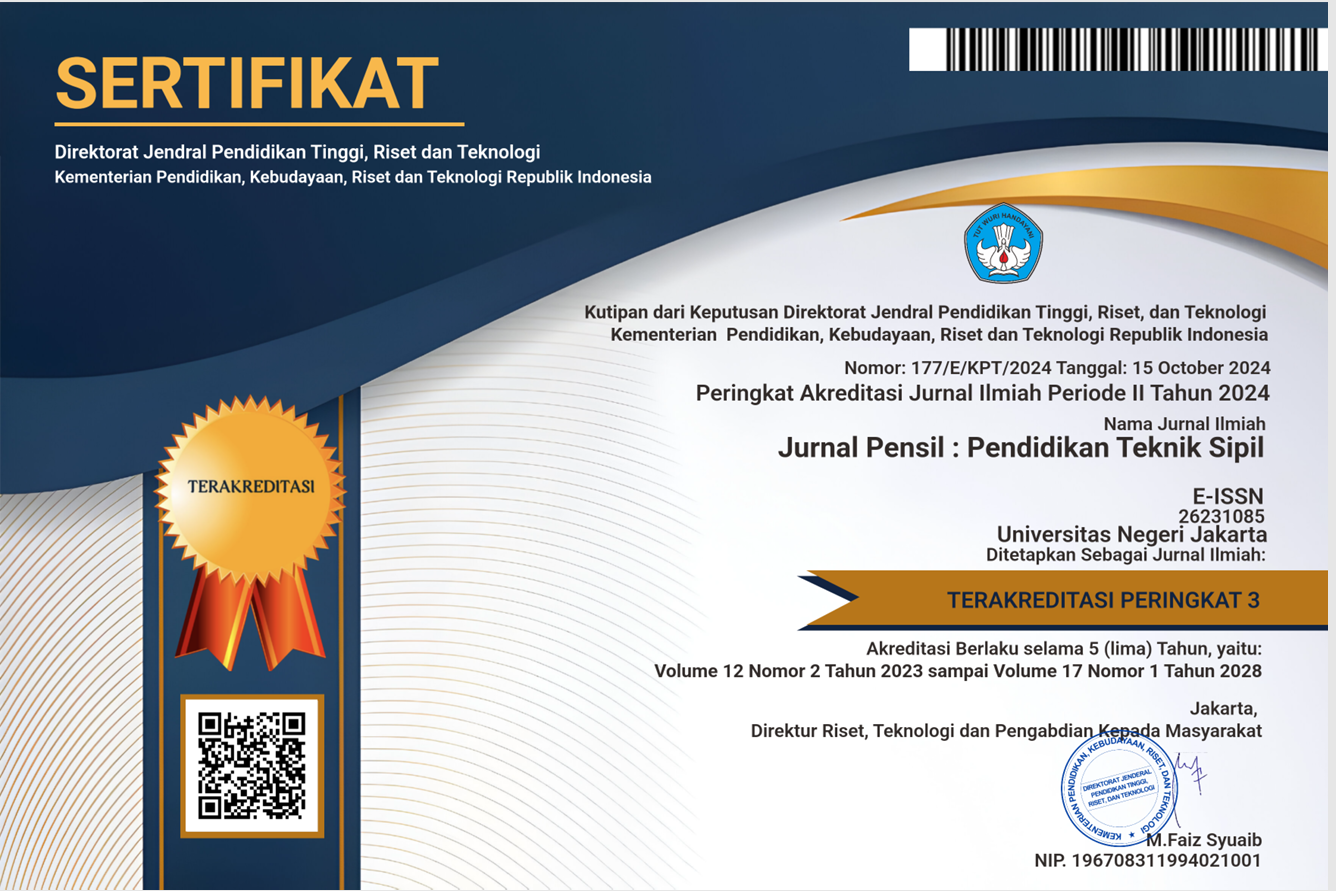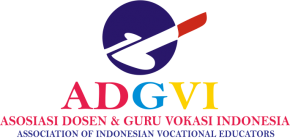Studi Analisis Tentang Pembelajaran Soft Skills Oleh Guru Terhadap Siswa Program Studi Keahlian Teknik Gambar Bangunan SMK Negeri 1 Jakarta
DOI:
https://doi.org/10.21009/jpensil.v3i2.9886Keywords:
Students achievement, students practice, descriptive analitycal study, soft skillAbstract
The objectives of this study analyzing the relationship between students learning achievement in the classroom and students of furniture engineering’s practice achievement. This study was conducted in SMKN 4 Jakarta, the population of this study were the year XI students which specialized in Furniture Engineering Competences and wood construction engineering, year 2012/2013 which consist of 18 students. The number of the sample is 12 students. The problem which the writer got from this study was that the students learning achievement was in proportion to the practice achievement, dan the opposite
The instrument of this study is a test which is used to know the relation between students’ learning achievements in the classroom and the students’ practice achievement. The quesioner shows that the data were valid and the reability was high with r11 = 0.8793, with 30 point of questions (20 multiple choice questions and 10 essay questions). The result of the study showed that students’ learning achievements average score was 76.7 and students practice achievement average score was 78.67.
It showed that the practice has a positive relationship (0.942). In other words, students’ learning achievement give contributions to the percentage of practice ability. The students have to prepare themselves to be focus to the lesson or material from the teacher and the teacher should prepare the material and better learning method to help the students to be able to receive all the materials.
References
Daryanto dan Darmiatun, Suryadi. (2013). Implementasi Pendidikan Karakter Di Sekolah. Yogyakarta: Gava Media.
Dewi, Riana K. (2013). Studi Tentang Sikap Professional Guru Dalam Proses Pembelajaran Mata Pelajaran Produksi: Survei Pada Program Keahlian Teknik Gambar Bangunan SMK Negeri 26 Jakarta Timur [Skripsi]. Jakarta : Universitas Negeri Jakarta, Fakultas Teknik.
Elfrindi, dkk. (2012). Soft Skills Untuk Pendidik. Jakarta. Baduose Media.
Firdaus, Arif dan Barnawi. (2012). Profil Guru SMK Professional. Yogyakarta. Ar-Ruzz Media.
Hadeli. (2006). Metode Penelitian Kependidikan. Padang: Quantum Teaching.
Hamzah, B. Uno. (2006). Perencanaan Pembelajaran. Jakarta: Bumi Aksara.
Hanafi, Abdul. (2011). Metodologi Penelitian Bahasa. Jakarta: Diadit Media.
Hoy, Wayne K. dan Miskel, Cecil G (2000). Educational Administration: Theory, Research, And Practice. Fifth Edition. New York: Mc Graw-Hill, Inc.
Kirk, F.G. dan Gustafon, K.L (1986). Instruksional Technology A Systematic Approach To Education. New York: Hlt Rinehart And Winston.
Makmun, Abin Syamsyuddin. (2003). Psikologi Pendidikan. Bandung: PT Remaja Rosdakarya.
Masjid, Abdul. (2013). Strategi Pembelajaran. Bandung: PT Remaja Rosdakarya.
Mudiyono dan Dimyati. (2009). Belajar Dan Pembelajaran. Jakarta: PT Rineka Cipta.
Nasution, S. (2008). Metode Research: Penelitian Ilmiah Edisi I Cetakan Ke-10. Jakarta: PT Bumi Aksara.
Pemerintah Republik Indonesia. (2003). Undang-Undang Republik Indonesia No. 20 Tahun 2003 Tentang System Pendidikan Nasional. Jakarta.
Purwanto. (2011). Statistika Untuk Penelitian. Yogyakarta: Pustaka Pelajar.
Ramadhan, M. Aghpin. (2012). Relevansi Kompetensi Lulusan Smk Program Keahlian Teknik Gambar Bangunan Kkehlian Tgb Terhadap Kompetensi Kebutuhan Kerja [Skripsi]. Jakarta: Universitas Negeri Jakarta, Fakultas Teknik.
Sagala, Syaiful. (2005). Konsep Dan Makna Pembelajaran. Bandung: CV. Alfabeta.
Sanjaya, W. (2007). Strategi Pembelajaran, Berorientasi Standar Proses Pendidikan. Jakarta: Penerbit Kencana Prenada Media Group.
Setyawan, Teriska R. (2012). Internalisasi Soft Skills Melalui Diklat Pakem Rangka Meningkatkan Mutu Pendidikan [Tesis]. Bandung: Universitas Pendidikan Indonesia, Fakultas Pendidikan.
Singarimbun M. dan Effendi, Sofyan. (2011). Metode Penelitian Survey. Jakarta: Pustaka LP3ES Indonesia.
Sugiyono. (2010). Metode Penelitian Kuantitatif Kualitatif & RND. Bandung: Alfabeta.
Tim. (2003). Kamus Besar Bahasa Indonesia. Jakarta: Balai Pustaka.
Wati, Widya. (2010). Strategi Pembelajaran Soft Skills Dan Multiple Intelegence [Makalah]. Padang: Universitas Negeri Padang, Program Pascasarjana.
Wicaksana, I Wayan S. (2012). Materi Kelas Soft Skills. http://iwayan.info/Lecture/Softskills/MateriKelasSoft. Diakses pada tanggal 28 Agustus 2014.
Widhiarso, W. (2009). Evaluasi Soft Skills Dalam Konteks Pembelajaran. http://widhiarso.staff.ugm.ac.id/2010/6/7 . Diakses pada tanggal 25 Agustus 2014.











.png)
.png)
1.png)

